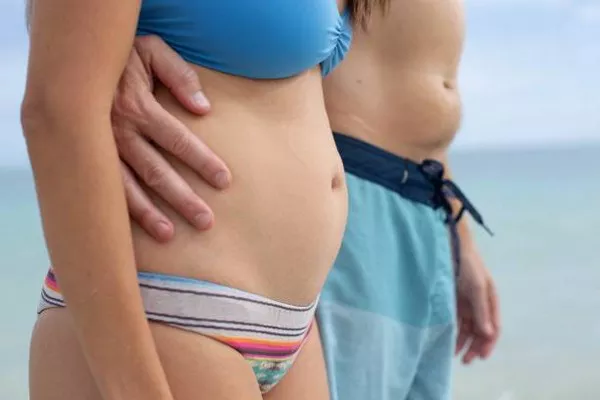Welcoming a new baby is an exciting and joyful time, but it can also bring about many changes to your body. One of the most common concerns for new mothers is losing the extra water weight gained during pregnancy. This guide will help you understand the process, set realistic expectations, and provide practical tips for shedding that water weight efficiently.
Understanding Water Weight During Pregnancy
What is Water Weight?
Water weight refers to the extra fluid your body retains during pregnancy. This retention is due to hormonal changes and the increased blood volume required to support your growing baby. It’s a natural and necessary part of pregnancy, but it can lead to feelings of bloating and discomfort.
Why Do You Retain Water During Pregnancy?
The primary reasons for water retention during pregnancy include:
Hormonal Changes: Hormones like progesterone cause your body to retain more sodium, leading to fluid retention.
Increased Blood Volume: Your body needs to produce more blood to support the placenta and growing baby, which increases fluid retention.
Pressure on Blood Vessels: The growing uterus puts pressure on your blood vessels, particularly those in your lower body, causing fluid to accumulate in your extremities.
How Long Does It Take to Lose Water Weight After Birth?
Immediate Postpartum Period
In the first few days after giving birth, your body will start to shed the excess water weight. This initial loss is often noticeable as your body begins to expel the extra fluid through urine, sweat, and reduced swelling.
The First Two Weeks
Most women experience significant water weight loss within the first two weeks postpartum. During this time, your body works to eliminate the retained fluids, and you’ll likely notice a reduction in swelling and bloating.
Full Recovery Timeline
Complete loss of water weight can take anywhere from a few weeks to several months, depending on various factors such as your diet, physical activity level, and overall health. Each woman’s body is different, and the rate of water weight loss can vary.
Factors Affecting Water Weight Loss
Breastfeeding
Breastfeeding can accelerate the process of losing water weight. It helps your uterus contract and return to its pre-pregnancy size more quickly, which can reduce fluid retention.
Diet and Hydration
Maintaining a balanced diet and staying well-hydrated are crucial. Consuming too much sodium can lead to additional water retention, while proper hydration helps flush out excess fluids.
Physical Activity
Engaging in light physical activity, such as walking or postpartum yoga, can promote circulation and help reduce fluid buildup in your tissues.
Rest and Sleep
Adequate rest and sleep are essential for overall recovery and can influence how quickly your body sheds excess water weight.
Practical Tips for Losing Water Weight After Birth
Stay Hydrated
Drinking plenty of water helps your body flush out excess fluids. Aim for at least 8-10 glasses of water a day to support this process.
Monitor Sodium Intake
Reducing your sodium intake can prevent additional water retention. Opt for fresh, unprocessed foods, and avoid high-sodium snacks and meals.
Engage in Light Exercise
Incorporate gentle exercises like walking, stretching, or postpartum yoga into your daily routine to improve circulation and reduce swelling.
Elevate Your Feet
If you experience swelling in your legs and feet, try elevating them when sitting or lying down. This can help reduce fluid buildup in your lower extremities.
Wear Compression Garments
Compression stockings or abdominal binders can help reduce swelling and support your body’s natural fluid balance.
Eat a Balanced Diet
Focus on a diet rich in fruits, vegetables, lean proteins, and whole grains. These foods can provide the necessary nutrients for recovery and help regulate your body’s fluid balance.
See Also: How Long Does It Take To Lose Weight After A C-section
Long-Term Strategies for Postpartum Weight Loss
Maintain a Healthy Diet
Continue to eat a balanced diet that supports your overall health and weight loss goals. Avoid fad diets and focus on sustainable, nutritious eating habits.
Gradually Increase Physical Activity
As you recover, gradually increase the intensity and duration of your workouts. Consult your healthcare provider before starting any new exercise regimen.
Monitor Your Progress
Keep track of your weight loss progress and any changes in your body. Celebrate small victories and stay motivated by setting realistic goals.
Seek Support
Join a postpartum support group or connect with other new mothers who are going through similar experiences. Sharing tips and encouragement can help you stay on track.
Common Concerns and FAQs
Can I Lose Water Weight Faster?
While it’s important to be patient with your body’s natural process, you can support it by staying hydrated, eating a balanced diet, and engaging in light exercise.
When Should I See a Doctor?
If you notice excessive swelling, severe pain, or any other unusual symptoms, consult your healthcare provider. These could be signs of complications that need medical attention.
How Much Weight Should I Expect to Lose?
The amount of water weight lost varies for each woman. On average, you might lose around 10-15 pounds in the first few weeks postpartum, but this can differ based on individual factors.
Is It Safe to Use Diuretics?
It’s best to avoid using diuretics unless prescribed by your doctor. They can lead to dehydration and other health issues if not used correctly.
What Role Does Diet Play in Losing Water Weight?
A balanced diet helps regulate your body’s fluid balance and supports overall health. Avoid high-sodium foods and focus on nutrient-dense options.
Conclusion
Losing water weight after birth is a natural process that takes time and patience. By understanding the factors involved and implementing healthy strategies, you can support your body’s recovery and achieve your postpartum weight loss goals. Remember to stay hydrated, eat a balanced diet, engage in light physical activity, and seek support from healthcare professionals and fellow new mothers. With these steps, you’ll be on your way to feeling more comfortable and confident in your postpartum body.


